Related Research Articles
The 2004 Constitution of Afghanistan was the supreme law of the Islamic Republic of Afghanistan, which lasted from 2004 - 2021. It served as the legal framework between the Afghan government and the Afghan citizens. Although Afghanistan was made a state in 1747 by Ahmad Shah Durrani, the earliest Afghan constitutional movement began during the reign of Emir Abdur Rahman Khan in the 1890s followed by the drafting in 1922 of a constitution. The 1964 Constitution of Afghanistan transformed Afghanistan into a modern democracy.
A 502-delegate loya jirga convened in Kabul, Afghanistan, on December 14, 2003, to consider the proposed Afghan Constitution. Originally planned to last ten days, the assembly did not endorse the charter until January 4, 2004. As has been generally the case with these assemblies, the endorsement came by way of consensus rather than a vote. Afghanistan's last constitution was drafted for the Democratic Republic of Afghanistan in November 1987.
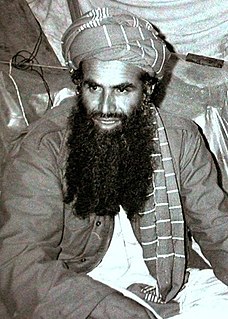
Abdulrab Rasul Sayyaf is an exiled Afghan politician and former mujahideen commander. He took part in the war against the Marxist–Leninist People's Democratic Party of Afghanistan (PDPA) government in the 1980s, leading the Afghan mujahideen faction Ittehad-al-Islami.

Dr. Massouda Jalal is the first woman in the history of Afghanistan who ran for the Office of the President of Afghanistan in 2002, and again in 2004. She holds the distinction of being the first woman to compete for presidency in Afghanistan, a highly conservative society where women's engagement in public life was considered improper, unacceptable, and previously banned. Dr. Jalal emerged as a leading voice of Afghan women in 2001 after her election as the Representative to the 2002 Loya Jirga. While serving her term, she became one of the frontrunners for the position of Interim President, opposite to ex-president Hamid Karzai.
A jirga is an assembly of leaders that makes decisions by consensus according to Pashtunwali, the Pashtun social code. It is conducted in order to settle disputes among the Pashtuns, but also by members of other ethnic groups who are influenced by them in present-day Afghanistan and Pakistan.
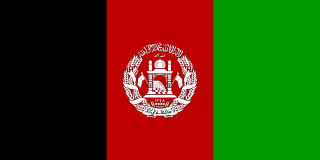
The Transitional Islamic State of Afghanistan (TISA), also known as the Afghan Transitional Authority, was the name of a temporary administration of Afghanistan put in place by the loya jirga of June 2002. It succeeded the original Islamic State of Afghanistan and preceded the Islamic Republic of Afghanistan (2004–2021).

Sibghatullah Mojaddedi was an Afghan politician, who served as Acting President after the fall of Mohammad Najibullah's government in April 1992. He was the first leader to call for armed resistance against the Soviet-backed regime in 1979 and founded the Afghan National Liberation Front at the time; later becoming a respected figure among the various Afghan mujahideen. He served as the chairman of the 2003 loya jirga that approved Afghanistan's new constitution. In 2005, he was appointed chairman of the Meshrano Jirga, upper house of the National Assembly of Afghanistan, and was reappointed as a member in 2011. He also served on the Afghan High Peace Council. Mojaddedi is considered to have been a moderate Muslim leader.
Musa Hotak is an Afghan military leader and politician from Maidan Shar of Wardak Province. He and his brother Ghulan Mohammed Hotak played prominent roles in the resistance to the Soviet occupation. They were not original members of the Taliban, but joined it when it was gaining power during the civil war that followed the overthrow of the communist regime.
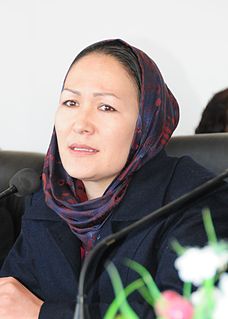
Azra Jafari is an Afghan politician and author. She was appointed as the first female mayor in Afghanistan by President Hamid Karzai in December 2008. She became the mayor of Nili, a town in Daykundi Province of Afghanistan. She belongs to the Hazara ethnic group.
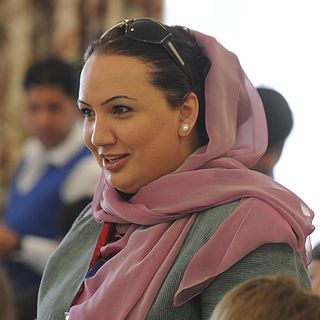
Shukria Barakzai is an Afghan politician, journalist and a prominent Muslim feminist. She was the Ambassador of Afghanistan to Norway. She is a recipient of the International Editor of the Year Award.
Mirwais Yasini میرویس یاسینی is the current First Deputy Speaker of the Lower House of the Afghan Parliament. Following the Communist coup in 1978, Mirwais Yasini worked actively to combat the Soviet invasion, and went on to oppose the Taliban from 1993 to 2001 as a social and political activist. After the fall of the Taliban regime in 2002, Yasini began his political career as the Director of Foreign Relations and Economic Evaluation for Afghanistan's Ministry of Finance, and as a prominent member of the Emergency Loya Jirga, which met in Kabul. Since that time he has held several high-level political posts, including such titles as the First Deputy Speaker of the Constitutional Loya Jirga and Director General of the Counter Narcotics Department.
The Afghan President Hamid Karzai announced the holding of a consultative grand council called the Afghanistan's National Consultative Peace Jirga (NCPJ) or shortly Peace Jirga in his inauguration speech on 19 November 2009, after winning elections for a second term, to end the ongoing Taliban insurgency. At the International Afghanistan Conference in London on 28 January 2010, he announced that the government would hold the event in April or May 2010, intended to bring together tribal elders, officials and local power brokers from around the country, to discuss peace and the end of the insurgency. "Jirga" is a word in the Pashto language that means "large assembly" or "council". It is a traditional method in parts of Afghanistan and Pakistan of resolving disputes between tribes or discussing problems affecting whole communities.
Hamida Barmaki was a renowned Afghan law professor and human rights activist. She was killed together with her family in a suicide attack.

An emergency loya jirga was held in Kabul, Afghanistan between 11 and 19 June 2002 to elect a transitional administration. The loya jirga was called for by the Bonn Agreement and Bush administration. The agreement was drawn up in December 2001 in Germany. Conducted under United Nations auspices, the talks at Bonn sought a solution to the problem of government in Afghanistan after the US ousted the Taliban government.
Afghan leaders who met at the December 2001 Bonn Conference which picked Hamid Karzai to lead the Afghan Transitional Authority also agreed that a Constitutional Loya Jirga should be convened to draft a new constitution.
Shakila is a citizen of Afghanistan. The Bonn Conference that chose Hamid Karzai as the leader of the Afghan Transitional Administration charged him to appoint a Constitutional Loya Jirga. Karzai appointed Shakila one of 502 appointees. She sat on the first of the Loya Jirga's ten committees, chaired by Ustad Sayaf. She was a member of the Gender and Law Working Group as a representative of the Ministry of Women’s Affairs.
Doctor Mahboba Hoqooqmal is an Afghan politician.
Anarkali Kaur Honaryar is a Sikh Afghan politician. She is also a women's rights activist and a dentist, as well as a medical doctor.
Seema Jowenda is an Afghan politician who is deputy governor of Kabul Province and was previously governor of Ghor province. As of November 2015, she was one of only two women to hold the position of provincial governor in the country. She replaced Sayed Anwar Rahmati in the job.
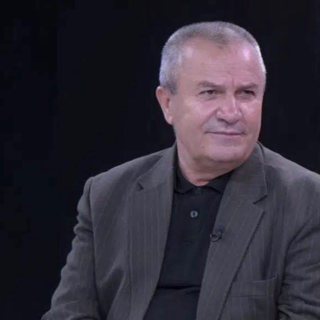
Faizullah Jalal was born in 22 May 1963 in Badakhshan, Afghanistan. He is a law and political science professor at Kabul University, one of the principle and oldest institutions of higher education in Afghanistan. He previously served as head the Department of Law and Political Science for 14 years, as the Vice-Chancellor of the Kabul University, and as Deputy Minister for Academic Affairs in the Ministry of Higher Education of Afghanistan. Professor Jalal has a bachelor's degree in Law and Political Science from Kabul University and a master's and Ph.D. in political science from the Tajik National University. He is the author of several published books and a variety of articles. His recent books include (1) Political Power and Nation-Building in Afghanistan, (2) The Face of International Terrorism, and (3) An Inquiry into Violence Against Women in Afghanistan.
References
- ↑ Hamida Ghafour (2003-12-22). "Women jailed for leaving husbands: Trying to flee domestic violence seen as a shameful crime". The Daily Telegraph . Retrieved 2012-04-13.
Even so, Jamela Mujahed, one of the 100 female delegates, and a former television presenter who had the distinction of informing Afghans that the Taliban regime collapsed in 2001, was not optimistic that the constitution would improve the lot of women.
- ↑ "Members of the afghan constitutional loya jirga". 2003-12-23. Archived from the original on 2011-05-08. Retrieved 2011-01-25.
- 1 2 Paula Dobriansky (2002-10-02). "Under Secretary of State for Global Affairs Paula Dobriansky speech presenting "Liberty Award" to Jamila Mujahed". United States Department of State. Archived from the original on October 15, 2011. Retrieved 2012-04-13.
On November 13, 2001, a lone voice over Radio Kabul announced to the people of Afghanistan the fall of the Taliban regime and the liberation of the capital city. While that news was historic in itself, the voice delivering it was almost as important as the message it carried because, for the first time in five years, it was a woman’s voice which filled the streets of Kabul. That voice belonged to Jamila Mujahed, and tonight we honor her as the recipient of Dialogue on Diversity’s special Liberty Award.
- ↑ Tom Allen (2002). "So laughter can rise again". National Geographic . Archived from the original on 2012-03-11. Retrieved 2012-04-13.
She became the editor-in-chief of Malalai, the first Afghan magazine published for women and another product of AINA assistance.